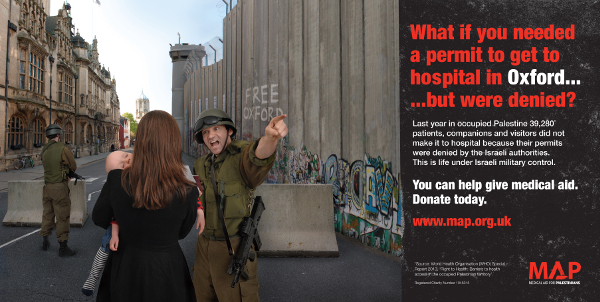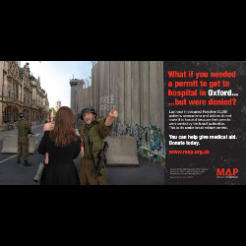An advertising campaign by Medical Aid for Palestinians (MAP) was absolved today on 21 counts of wrongdoing by the Advertising Standards Agency (ASA) but one complaint was upheld.
The multimedia MAP campaign which ran in September 2013 was shown in local newspapers, direct mailing and leaflets, and claimed that 39,280 Palestinians were refused permits to attend hospitals.
MAP was criticised for not making it clear that the figure of 39,280 included companions and family members as well as patients, but all the complaints were otherwise struck down.
The regional press advert was titled: “What if you needed a permit to get to hospital in Oxford … but were denied?" Further text read: "Last year in occupied Palestine 39,280 patients, companions and visitors did not make it to hospital because their permits were denied by the Israeli authorities. This is life under Israeli military control."
The direct mailing campaign was similarly headed: "Imagine if Oxford were under military occupation” and went on to state: “Right now, there are more than 500 military checkpoints and road barriers throughout the West Bank. Every person, regardless of their age or condition, has to negotiate these obstacles. The delays and the disruption to their lives compromise their most basic human rights.”
UK lawyers for Israel and for Baroness Deech, an academic and former member of the Jewish Leadership Council, challenged several points, including the adverts' claim that around 500 military checkpoints in the West Bank made it difficult for people to get to hospital quickly.
In response, the ASA provided details about the sources of MAP’s figures and dismissed the complaint.
The ASA adjudication stated: “The complainants believed [that the checkpoint figure] was not based on up-to-date figures and that it was contradicted by a statement by B'Tselem from December 2012… We considered that documentary evidence from December 2012 was sufficiently up-to-date to support the claim in the ad, which had appeared in September 2013. We therefore concluded the claim ‘Right now, there are more than 500 military checkpoints and road barriers throughout the West Bank’ had been substantiated and was not misleading.”
The ASA did uphold one complaint about the adverts' claim that “39,000 Palestinians had their permit request to get to hospital denied". The complaint claimed that one of the three adverts implied that all of those individuals were patients, whereas the WHO figures on which the claim was based did not distinguish between patients, companions and family members.
The ASA concluded that: “We considered that, in the absence of qualification, the average reader would understand from the claim… that 39,000 patients had had their permit request to get to hospital denied.
“We noted that ad (a) referred to ‘patients, companions and visitors’ and considered that ad (b) should also have made clear that the figure included companions and family members. Because it did not, we concluded the claim was misleading.”
Jo O’Neill, director of marketing at MAP, told Civil Society News that the adjudication “comprehensively vindicates the claims made in our advertising which highlighted the number of Palestinians refused permits by the Israeli authority to visit hospitals in Occupied Palestine.
“It’s a long process going through a complaint, particularly a complaint going through 22 claims against our advertising. Before running the adverts, we did actually go to the ASA to get it checked out. That’s standard procedure and they approved it. MAP are an organisation that take all these matters very seriously… because we know that there are people out there who are looking to target organisations that work to the wellbeing of Palestinians.
“In 90 per cent of the advertising that we used, we did reference the key things that the numbers of permits that were refused included patients, companions and visitors. So we feel very vindicated.”










